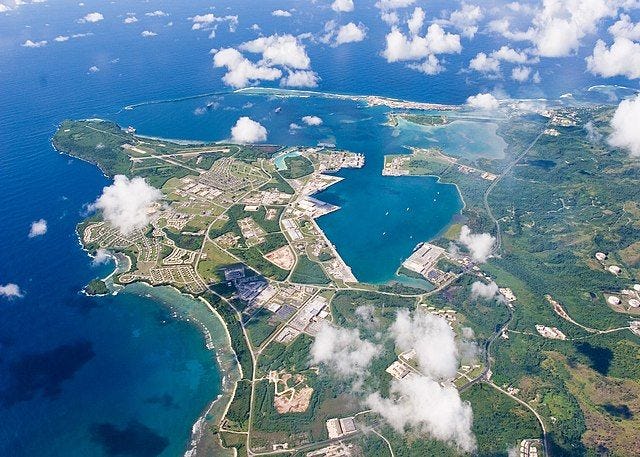Guam, Trapped by the Poverty of "Indo-Pacific" Strategy
After six months of working, waiting, and revising an essay on Guam's strategic choices, it's finally out, in Dissent Magazine. I'm a Dissent-nik!
I decided a few years ago to only write when my soul is in it or my curiosity is piqued. This is both--an essay that reveals a remarkable feebleness in US strategy, but also an essay I think might make my ancestors (who came to America by way of working the plantations in Hawai'i) proud. From the essay:
Guam’s subordinated political status, a useful instrument for U.S. policymakers, is a stain on the values they burnish in speeches and summits. While hypocrisy is nothing new in U.S. foreign policy... Washington’s approach to power-politicizing the Pacific rests on a feeble intellectual construction that improves nobody’s security and makes more likely the very nightmare of war that it prepares for.
Basically, Guam is an imperial relation within US liberal internationalism. I'm not saying that as an epithet--US-Guam relations meet the most rigorous definitions of empire. Unsurprising, then, that the United States continues to ignore Guam's local demands for self-determination. There's an active effort in Guam to decolonize even as it has a complicated and (tbh fairly dependent) relationship with the United States. But what self-determination should look like is not preordained.
So in the essay I chart out Guam's strategic choices: statehood, national independence, and "free association" (i.e., autonomy within a US sphere of influence). All the choices have huge downsides because of how the United States has structured relations with Guam. Muddling along as a status quo where it remains a US territory denied self-determination is also fraught with downsides.
The thing that's really interesting about all this is the interplay of indigenous justice, Pacific history, and the fantasies of the national security mind. Washington's geopolitical imagination is stuffed with bad ideas and dubious concepts, largely in service of false (or at least incomplete) narratives about US foreign policy.
To see the world like a "great power," or through the lens of American exceptionalism, is to ignore basic issues of justice and to look past your own hypocrisies, only to face a world that has the receipts for your misdeeds. And in Guam's case specifically, US strategy has for decades been exploiting the political reality of US exclusionary control of Guam for the unique geopolitical advantages it thinks it offers.
But these are not actually advantages. Rather, they're excuses to perpetuate injustices that feed grievances and reduce insecurity. As James Baldwin said during the Cold War:
the only real advantage Russia has...is the moral history of the Western world. Russia's secret weapon is the bewilderment and despair and hunger of millions of people of whose existence we are scarcely aware.
If Washington can't see its own history accurately, then it can neither meet basic demands of justice in the present nor meet the world as it is. And that means it can't make the world safe for democracy, as it has for so long imagined itself to be doing.


